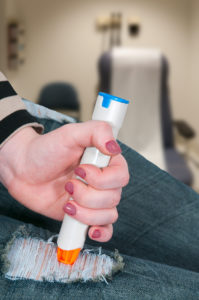
ANAPHYLAXIS
What is it?
Anaphylaxis is a severe, generalized life-threatening allergic reaction that starts suddenly and progresses very rapidly. It is estimated that as much as 1% of the population may be at risk. The episodes appear to be increasing in frequency. The risk factors that predispose an individual to anaphylaxis are atopy, asthma and female gender.
Common triggers:
Sensitization and exposure to:
- Medications: Penicillins, Sulfa derivatives, Aspirin, Insulin, Radio-contrast dyes, etc.
- Foods allergies: Nuts (cashew, pistachio, walnut, pecan, almond, etc.), Legumes (i.e., peanuts), Shellfish (crab, lobster, oyster, scallops, shrimp, etc.), Egg, Milk, etc.
- Insect venoms: Honey bee, Yellow Jackets, Hornets, Wasps, Fire ants, etc.
- Biological drugs: [Humira (adalimumab), Enbrel (etanercept), Remicade (infliximab), etc.
- Latex: Gloves, Balloons, Condoms, Dental dams, etc.
- Physical exercise (sometimes food-dependent)
- Idiopathic (unidentifiable cause)
Mechanism of causation:
Types of cells in the blood and tissues called mast cells and basophils release chemicals like histamine which cause blood vessels to dilate (dropping blood pressure) and leakage of fluid into the tissues causing swelling of the airways and difficulty in breathing.
Symptoms:
- Skin: pale, clammy, generalized itching, flushing, hives, swelling
- Respiratory: wheezing, congestion, difficulty in breathing, coughing
- Heart: low blood pressure, weak pulse, irregular heartbeat, chest pain
- Gastrointestinal: abdominal cramps, nausea, vomiting, diarrhea
- Neurological: headache, dizziness, lightheadedness, seizure, loss of consciousness
Duration:
- Uniphasic: Symptoms subside within 1-2 hours.
- Biphasic: Recurrence of symptoms after the resolution of the initial episode which frequently occurs about 8-12 hours after the initial episode. The recurrence of symptoms hours after the initial immediate episode of symptoms is referred to as the “late phase.”
- Protracted: Symptoms last for several hours.
Diagnosis:
Most of the time, the diagnosis is suggested by a history of rapid onset of the classical symptoms following an exposure to a known trigger. Sometimes a few laboratory tests like elevated serum tryptase levels may be needed for confirmation. Because of the short half-life of tryptase, a blood sample should preferably be drawn within 3 hours after the onset of symptoms.
Skin prick tests and/or blood tests may be needed to detect an elevated specific IgE antibody to a particular allergen in order to identify the possible trigger. However, in some instances, a specific cause can remain elusive in spite of a detailed history and a comprehensive laboratory evaluation.
Management:
As soon as the diagnosis is made, rapid injection of Epinephrine (Adrenaline) into the thigh muscle can be life-saving. Some patients also may need Albuterol inhalations, Oxygen supplementation and IV fluids depending on the severity of the episode. Close monitoring is essential during this time.
Prevention:
Whenever a trigger is positively identifiable by history or laboratory tests, strict avoidance of exposure to the offending agent at all times is mandatory. Knowledge of possible cross reacting foods and medications is essential.
All patients with a history of anaphylaxis or at risk for anaphylaxis should carry an automatic self-injectable epinephrine syringe (i.e., EpiPen, Auvi-Q, Adrenaclick) at all times. They need to be trained on the proper usage of the device. Wearing a medical alert bracelet or necklace which clearly lists a person’s allergies is also extremely helpful.
Recommendation:
If you have experienced anaphylaxis or experienced some of the milder symptoms of anaphylaxis, please call us for an appointment. The allergists at Black & Kletz Allergy are board certified in adult and pediatric allergy and immunology. We have the expertise to make sure that the chance of you developing anaphylaxis is greatly minimized, if not totally prevented. We also educate our patients about what to do in case anaphylaxis occurs as it can be a life-threatening condition. Black & Kletz Allergy has been serving the Washington, DC metropolitan area for more than 50 years.
